YORKTON - Saskatchewan had a good first quarter financially, which has the government expecting a good year, and they moved recently to announce they would be sharing the good year with residents.
For the first quarter, revenue is forecast to be $19.17 billion, up $2.02 billion (11.7 per cent) from budget. This is largely due to a $1.86 billion increase in non-renewable resource revenue from higher potash and oil prices.
As a result, Finance Minister Donna Harpauer has announced a four-point affordability plan.
"Strong resource prices have meant higher provincial revenues, and that's good news, but it also means the cost of almost everything you buy has gone up," she said in a recent release. "That's why our government is using those higher revenues to help Saskatchewan people with the rising cost of living."
Most notably, all Saskatchewan residents who are 18 years of age or older as of Dec. 31, 2022 and who have filed a tax return, will receive a one-time $500 Saskatchewan Affordability Tax Credit cheque this fall.
The plan also excludes gym and fitness memberships and some recreational activities from the admissions, entertainment and recreation PST expansion planned for Oct. 1, 2022.
The plan also continues the temporary small business tax reduction at zero per cent, and will retire of up to $1 billion in debt, made possible by the projected surplus.
Yorkton MLA Greg Ottenbreit said the announced initiatives have not satisfied everyone, but he said he still believes the plan “is the right thing to do.”
Ottenbreit said the plan was created with a lot of consideration, adding Premier Moe suggested even ahead of the last budget that if finances looked good something would be done by the fall, adding the process of discussions started in March, April and May.
When the good numbers financially through the first quarter were finalized it sped up the process.
“Then things rolled out pretty quickly,” said Ottenbreit.
As for the $500 cheques Ottenbreit said there have been various voices suggesting the province needed to do something to help consumers in the face of rising costs.
“Everybody is feeling the pressure of things going up,” he offered. “. . . This puts money in their pockets.”
While acknowledging some have come out suggesting the money might have been better used by adding it to health care and education funding, Ottenbreit said the government is already investing in those areas.
In the area of health care “it’s not so much the finances as it’s trying to find people,” he added.
The $500 cheques should roll out in November, just ahead of Christmas, where Ottenbreit admitted they will help local businesses as the money is spent.
“It’s going to boost the economy,” he said.
The Saskatchewan Chamber of Commerce is one organization to come out in favour of four-point affordability plan
“We continue to navigate the impacts of the pandemic, such as labour market challenges, supply chain disruptions and inflation,” said SCC CEO Prabha Ramaswamy in a release. “Many of our members have voiced that they are still facing significant challenges in sustaining their business – specifically with escalating costs. Therefore, we welcome the provincial government’s announcement of a four-point affordability plan.”
In particular, the SCC pointed to the extension of the small business tax rate reduction to 2024 to help mitigate the economic impacts that the Saskatchewan business community is experiencing as a positive.
“This will assist small businesses in saving costs during this time of inflation and supply chain disruptions,” continued Ramaswamy.
The SCC also said the government’s decision to retire up to $1 billion in operating debt resulting in significant savings on the cost to service the debt, was a good step to take.
“Right now, businesses value a fiscally prudent government that pays down debt and also invests in its people and in the future of the province,” noted Ramaswamy.
Not surprisingly the Opposition New Democrats were less supportive of the plan.
“We’ve been calling for affordability relief for months. The Sask. Party government has hidden and hoarded billions of windfall resource revenues since March, yet they still hiked taxes, fees and utility rates. Waiting until the eve of a byelection to buy votes - while families have struggled for months - is completely irresponsible,” said Official Opposition Finance Critic Trent Wotherspoon in a release Tuesday.
The NDP suggested the Sask. Party’s affordability payment is a fraction of the increases in household expenses since they tabled this budget.
“The Sask. Party is giving regular people a one-time payment of their own tax dollars, while pocketing federal cash once again,” said Wotherspoon in the release. “Instead of acting quickly to help people when they needed it most, this government is dead-set on recklessly taxing regular working people into submission, with no end in sight.
“At the same time the Finance Minister wasted eight grand on a single flight to North Battleford, families had to cancel road trips just to put food on the table. The people of Saskatchewan deserve a government that doesn’t buy their trust, but earns it.”
The $500, and other elements of the affordability plan are only possible because of a robust rebound in resource sector revenue, primarily the potash sector boosted by Belarus sales being impacted by their support of the Russian invasion of Ukraine, said Ottenbreit.
However, Ottenbreit said it’s not only potash, with better numbers from oil and gas, and interest in everything from uranium and gold, to helium, lithium and rare earth minerals.
“We can’t count on it on a year after year,” he said, adding resource sector sales can go up and down, but at present they are clearly doing well, allowing the province to pass some of the revenue back to residents.




.JPG;w=120;h=80;mode=crop)

